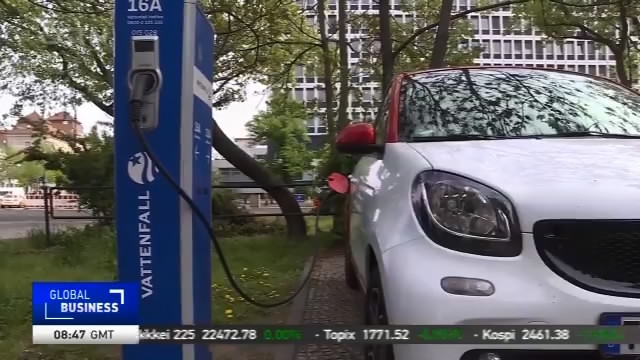
23:15, 04-May-2018
German Electric Cars: Sales of plug-in vehicles set records
02:45

Sales of plug-in vehicles in Germany have set records this year, as drivers appear to be warming up to the technology. But questions remain about whether German automakers are ready to handle the increased demand and what the role of car ownership will be in the future. CGTN's Ira Spitzer reports from Berlin.
"That's a sign that it's charging."
This Berliner really loves his Smart Electric Drive two-seater, made by the German company Daimler.
"And you don't hear anything."
He made the switch to fully electric about a year ago and hasn't looked back. He's not alone in this country known for both its car-loving culture, but also its concern for the environment. German consumers bought nearly seven thousand plug-in vehicles in March, the highest monthly total ever.
CHRISTOPH KRACHTEN PLUG-IN VEHICLE OWNER "Here in the cities, we have many problems with polluted air. So electric cars are really an advantage for all people in the city."
He's confident that technology will soon address the two main drawbacks of plug-in vehicles - that a battery doesn't go as far as a full tank of gas and it takes much longer to charge than to fill a tank.
IRA SPITZER BERLIN "Owners of plug-in vehicles in Berlin can find hundreds of charging stations like this one here, usually just a few blocks from where they live. Still, despite record sales in March, plug-in vehicles accounted for only about two percent of the new cars sold in Germany since January."
The powerful German car industry has been criticized for being slow to embrace production of plug-in vehicles although BMW and Volkswagen are now among the top ten in global sales.
ANDREAS KNIE BERLIN SOCIAL SCIENCE CENTER "Combustion engines are a lot better for profit than electric cars and that's the reason why the German car manufacturers are doing more in combustion engines than in electric cars."
He says German car makers are worried about the research and development costs of electric vehicles. But, another question facing electric vehicle producers is whether private auto sales will continue to dominate the market.
JOERG WELKE BERLIN AGENCY FOR ELECTROMOBILITY "I don't think the future of mobility will mean simply exchanging everyone's combustion engine for an electric one. That would only be a small victory."
Welke sees a large role for public transportation and vehicle sharing. However, he says that electric is clearly better from an environmental perspective since electricity can come from renewable sources unlike fossil fuels. And that's a reason that many people here hope that combustion engines will soon be in the rear view. Ira Spitzer, CGTN, Berlin.

SITEMAP
Copyright © 2018 CGTN. Beijing ICP prepared NO.16065310-3
Copyright © 2018 CGTN. Beijing ICP prepared NO.16065310-3